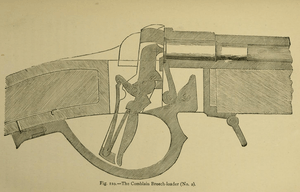M1870 Belgian Comblain
The M1870 Belgian Comblain was a falling-block rifle invented by Hubert-Joseph Comblain of Liège, Belgium and produced in several variants known as the Brazilian, Chilean or Belgian Comblain.
| M1870 Belgian Comblain | |
|---|---|
 Chilean soldier during the War of the Pacific and his Comblain[1] | |
| Type | Service rifle |
| Place of origin | Belgium |
| Service history | |
| Used by | Belgian, Brazilian and Chilean armies |
| Wars | War of the Pacific WWI
|
| Production history | |
| Designer | Hubert-Joseph Comblain |
| Specifications | |
| Mass | 4.3 kg (without bayonet) |
| Length | 130 cm (without bayonet) |
| Cartridge | 11×50mm R Comblain |
| Cartridge weight | 40 gr |
| Caliber | 11mm |
| Action | Falling-block |
| Rate of fire | 10 shots/min |
| Effective firing range | 300 m |
| Maximum firing range | 1300 m |
| Sights | Iron |
W.W Greener wrote in Modern breechloaders: sporting and military in 1871 (page 214):
- This rifle is called No.2, to distinguish it from the first Comblain, which is a modification of the Snider principle. The Comblain no 2 has the vertical sliding block and guard lever of the Sharp rifle; but the arrangement for exploding the cartridge is different.
- The mechanism of the lock is fixed in the breech block, which consists of the ordinary main-spring acting upon a tumbler by a swivel. The tumbler and striker are made in one piece; the scear and trigger are also in one piece . By depressing the lever the breech block is brought down, the cartridge-case extracted and the rifle is cocked. A fresh cartridge being inserted, and the lever returned, the rifle is ready for firing.

Comblain Breech block.
- The hinge screw can be removed without the aid of a turnscrew, which arrangement allows the breech block and lock to be taken out for the purpose of cleaning.
- The breech arrangement is strong and simple. It is used by the Belgian volunteers, and has been severely tested both at Liege and Wimbledon.
Users
Sources
This article is issued from Wikipedia. The text is licensed under Creative Commons - Attribution - Sharealike. Additional terms may apply for the media files.